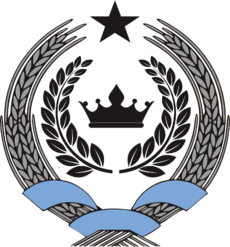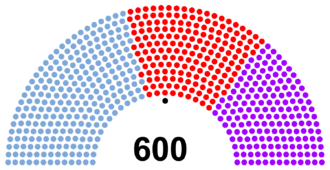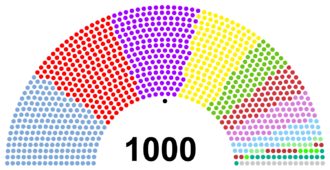Cacertian Parliament: Difference between revisions
mNo edit summary |
mNo edit summary |
||
| Line 82: | Line 82: | ||
The '''Parliament of the Kingdom of Cacerta''', commonly known as the '''Cacertian Parliament''', is the {{wpl|legislature|legislative body}} of the [[Cacerta|Kingdom of Cacerta and its overseas territories]]. It possesses {{wpl|parliamentary sovereignty|legislative supremacy}} over the entire Kingdom with the nation's monarch serving as its head. Its seat is located in the Parliamentary Palace, which can be found directly beneath the Royal Palace in the [[Torre Alta]] of [[Vichenza]]. | The '''Parliament of the Kingdom of Cacerta''', commonly known as the '''Cacertian Parliament''', is the {{wpl|legislature|legislative body}} of the [[Cacerta|Kingdom of Cacerta and its overseas territories]]. It possesses {{wpl|parliamentary sovereignty|legislative supremacy}} over the entire Kingdom with the nation's monarch serving as its head. Its seat is located in the Parliamentary Palace, which can be found directly beneath the Royal Palace in the [[Torre Alta]] of [[Vichenza]]. | ||
The Parliament is {{wpl|bicameral}}, made up of an {{wpl|upper house}} (known as the [[Cacertian House Assembly|House Assembly]]) and {{wpl|lower house}} (known as the [[Cacertian Common Assembly|Common Assembly]]). The House Assembly is an elected house that is made up of an of members from Cacerta's [[List of Cacertian Noble Houses | The Parliament is {{wpl|bicameral}}, made up of an {{wpl|upper house}} (known as the [[Cacertian House Assembly|House Assembly]]) and {{wpl|lower house}} (known as the [[Cacertian Common Assembly|Common Assembly]]). The House Assembly is an elected house that is made up of an of members from Cacerta's [[List of Cacertian Noble Houses|royal houses]]; in order to be eligible to be a candidate for the House Assembly election, one must either properly qualify or be nominated by the Assembly’s corresponding vocational panel. The Common Assembly is a democratically elected house with elections held every five years; all citizens of Cacerta are eligible to participate. The two Houses meet in one chamber in the Parliamentary Palace in Vichenza. | ||
The Parliament of the Kingdom of Cacerta was formed several weeks after the unification of Cacerta as part of the official foundation of the [[Monarchy of Cacerta|Monarchy]] in 1871. It served as a balancing power to the supreme authority of the sovereign. Since then, significant reforms have taken place that have provided Parliament with significantly more political influence than its original counterpart. Despite this, significant legislative power is still vested in the Crown and—as such—no legislation may pass without a Monarch's consent. | The Parliament of the Kingdom of Cacerta was formed several weeks after the unification of Cacerta as part of the official foundation of the [[Monarchy of Cacerta|Monarchy]] in 1871. It served as a balancing power to the supreme authority of the sovereign. Since then, significant reforms have taken place that have provided Parliament with significantly more political influence than its original counterpart. Despite this, significant legislative power is still vested in the Crown and—as such—no legislation may pass without a Monarch's consent. | ||
Revision as of 14:49, 19 June 2021
This article is incomplete because it is pending further input from participants, or it is a work-in-progress by one author. Please comment on this article's talk page to share your input, comments and questions. Note: To contribute to this article, you may need to seek help from the author(s) of this page. |
Parliament of the United Kingdom of Cacerta | |
|---|---|
 Greater Coat of Arms of the Parliament of Cacerta | |
| Type | |
| Type | |
| Houses | House Assembly Common Assembly |
| History | |
| Founded | 26 January 1871 |
| Leadership | |
Anelyn I since 31 July 2019 | |
Valeriana Khushrenada since 31 July 2019 | |
Azzura Padova since 31 July 2019 | |
Cordelia Peraino since 5 June 2019 | |
| Structure | |
| Seats | 1,600 consisting of 600 House Members and 1,000 Common Members |
 | |
House Assembly political groups | |
 | |
Common Assembly political groups | HM Government
Other Opposition Speaker |
| Elections | |
House Assembly last election | 5 June 2019 |
Common Assembly last election | 5 June 2019 |
| Meeting place | |
| Parliamentary Palace, Vichenza, Cacerta | |
The Parliament of the Kingdom of Cacerta, commonly known as the Cacertian Parliament, is the legislative body of the Kingdom of Cacerta and its overseas territories. It possesses legislative supremacy over the entire Kingdom with the nation's monarch serving as its head. Its seat is located in the Parliamentary Palace, which can be found directly beneath the Royal Palace in the Torre Alta of Vichenza.
The Parliament is bicameral, made up of an upper house (known as the House Assembly) and lower house (known as the Common Assembly). The House Assembly is an elected house that is made up of an of members from Cacerta's royal houses; in order to be eligible to be a candidate for the House Assembly election, one must either properly qualify or be nominated by the Assembly’s corresponding vocational panel. The Common Assembly is a democratically elected house with elections held every five years; all citizens of Cacerta are eligible to participate. The two Houses meet in one chamber in the Parliamentary Palace in Vichenza.
The Parliament of the Kingdom of Cacerta was formed several weeks after the unification of Cacerta as part of the official foundation of the Monarchy in 1871. It served as a balancing power to the supreme authority of the sovereign. Since then, significant reforms have taken place that have provided Parliament with significantly more political influence than its original counterpart. Despite this, significant legislative power is still vested in the Crown and—as such—no legislation may pass without a Monarch's consent.
History
Origins
The Unified States of Cacerta was founded on 3 January 1871 following extensive negotiations between the five primary factions and the resulting merger of the Kingdom of Cacerta, Lombardo Matriarchy, Commonwealth of Apullia Federation of South Cacerta under the Act of Unification of the Cacertian Isles. Cacerta’s Parliament was founded as a result of the Act which required a legislative body to represent the five regions of the newly founded Kingdom equally.
Unified States of Cacerta
In its original form, the House Assembly of the Parliament of Cacerta was far superior in its legislative power to the Common Assembly despite possessing an equal amount of representative members. As a result, much of the early legislation passed in the first years of a unified Cacertian Archipelago were heavily swayed in the favor of the landowning elite class. King Victor had intentions of reforming the Parliamentary system in Cacerta following its first session in 1871, but was unable to enact any of his reforms prior to his death.
Cacertian Empire
Kingdom of Cacerta
Composition and Powers
The legislative authority of Cacertian Parliament consists of three main parts: the Monarch, House Assembly, and Common Assembly. No individual is capable of being a member of both Assemblies and members of the House Assembly are required to pass a vocational panel or be nominated by said panel in order to be elected.
For any Bills to become law in the Kingdom, they are required to have the Monarch's Royal Assent following deliberation and discussion regarding advantages and disadvantages. While a vote is required for Bills to pass, a Cacertian Monarch possesses the power to veto a vote entirely, though this power has never been used. The Monarch maintains a number of executive powers that do not depend on the Parliament which include the ability to declare war, award honors, and appoint officers and other civil servants. This is often accomplished based on the advice of the Prime Minister and Royal House Council, although this is not always the case.
State Opening
The State Opening of the Cacertian Parliament is held every year following the close of Autunno Racculto in early December. It marks the beginning of each primary session of Parliament regarding the state of the Kingdom over the past year. The State Opening is started with speeches from both Assembly Speakers as well as one prepared by the ruling monarch. It is primarily ceremonial as no issues are discussed in depth during the State Opening and are not brought up again until after its conclusion.